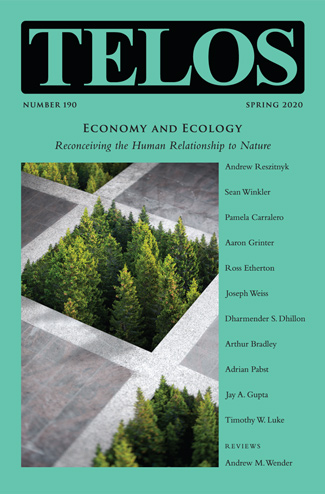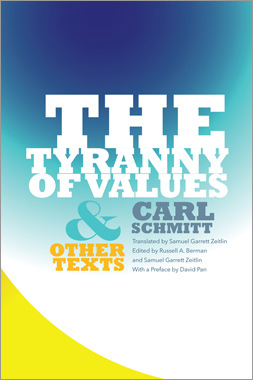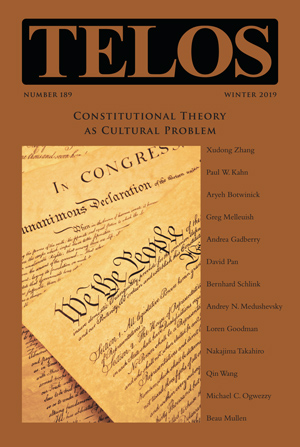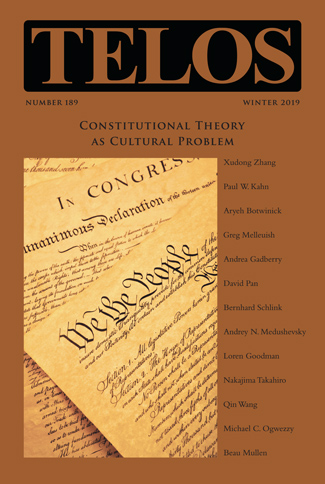By David Pan · Monday, March 16, 2020 Telos 190 (Spring 2020): Economy and Ecology: Reconceiving the Human Relationship to Nature is now available for purchase in our store. Individual subscriptions to Telos are also available in both print and online formats.
 Our human relationship to nature defines our economic life. As Marx articulated in the 1844 manuscripts, labor involves an engagement with nature in order to fulfill human ends, the working up of nature as an “inorganic body.” Consequently, the world of work and that of the environment are really two aspects of our relationship to nature, and the shift in academic interest from economy to ecology as the burning issue of the day does not represent any real change in perspective. On a fundamental level, economy is ecology and vice versa. Thus, the issue of climate change is primarily one about the energy structure of our economy. If that structure before the Industrial Revolution boiled down to the way in which we were cutting down our forests, today the issue is how fossil fuels are leading to climate change. The other global natural disaster of our day, the coronavirus, has arisen as a consequence, first, of our treatment of wild animals as food and, second, of economic globalization, whose movements have established the pathways for the rapid spread of viruses. Our human relationship to nature defines our economic life. As Marx articulated in the 1844 manuscripts, labor involves an engagement with nature in order to fulfill human ends, the working up of nature as an “inorganic body.” Consequently, the world of work and that of the environment are really two aspects of our relationship to nature, and the shift in academic interest from economy to ecology as the burning issue of the day does not represent any real change in perspective. On a fundamental level, economy is ecology and vice versa. Thus, the issue of climate change is primarily one about the energy structure of our economy. If that structure before the Industrial Revolution boiled down to the way in which we were cutting down our forests, today the issue is how fossil fuels are leading to climate change. The other global natural disaster of our day, the coronavirus, has arisen as a consequence, first, of our treatment of wild animals as food and, second, of economic globalization, whose movements have established the pathways for the rapid spread of viruses.
Continue reading →
By Telos Press · Friday, February 21, 2020 Writing in the new issue of Philosophy in Review, Adam Sliwowski reviews Carl Schmitt’s The Tyranny of Values and Other Texts, translated by Samuel Garrett Zeitlin, edited by Russell A. Berman and Samuel Garrett Zeitlin, with a preface by David Pan. Order your copy in our online store, and save 20% on the list price by using the coupon code BOOKS20 during the checkout process.
An excerpt:
 The works of Carl Schmitt—a German jurist and political theorist infamous for his involvement with National Socialism—continue to have wide international appeal, influencing scholars in a number of fields from political science and jurisprudence to political-theology and existential philosophy. Nevertheless, much of his prolific oeuvre, written over the span of almost 70 years, remains untranslated into English. With The Tyranny of Values and Other Texts, Samuel Garrett Zeitlin takes a step in filling this gap with an edited collection of finely translated and helpfully annotated texts that appear in English for the first time. This collection of occasional pieces, spanning from the Weimar era to the Cold War, shows Schmitt responding to a diverse array of socio-political exigencies and world-historical developments, while also shedding light on many of the central themes of Schmitt’s work, such as the distinction between legality and legitimacy, land and sea, the nomos of the earth, and the figure of the partisan. The works of Carl Schmitt—a German jurist and political theorist infamous for his involvement with National Socialism—continue to have wide international appeal, influencing scholars in a number of fields from political science and jurisprudence to political-theology and existential philosophy. Nevertheless, much of his prolific oeuvre, written over the span of almost 70 years, remains untranslated into English. With The Tyranny of Values and Other Texts, Samuel Garrett Zeitlin takes a step in filling this gap with an edited collection of finely translated and helpfully annotated texts that appear in English for the first time. This collection of occasional pieces, spanning from the Weimar era to the Cold War, shows Schmitt responding to a diverse array of socio-political exigencies and world-historical developments, while also shedding light on many of the central themes of Schmitt’s work, such as the distinction between legality and legitimacy, land and sea, the nomos of the earth, and the figure of the partisan.
Continue reading →
By Andrey N. Medushevsky · Thursday, January 2, 2020 Andrey N. Medushevsky’s “Law and Revolution: The Impact of Soviet Legitimacy on Post-Soviet Constitutional Transformation” appears in Telos 189 (Winter 2019), a special issue on constitutional theory. Read the full article at the Telos Online website, or purchase a print copy of the issue in our online store. Individual subscriptions to Telos are available in both print and online formats.
 The systematic investigation of the Russian revolutionary tradition in comparative, historical, and functional perspective provides the opportunity to understand its impact on the creation of the modern world and the contemporary social and political system. This article discusses the meaning, formation, and evolution of the Soviet project—the concept and practice of social and legal reorganization in Russia inspired by Marxist philosophical ideas and fulfilled during the period from the Bolshevik Revolution of 1917 until the collapse of the Soviet regime in 1991. Employing a cognitive theoretical approach in historical studies, the author examines the role of Communist myth in the formation of the Soviet state, the ideological and legal grounds of one-party dictatorship, the nature of nominal constitutionalism, and the role of institutional continuity in the formation of the current political system. He shows the place of the permanent grounds (ideology, nominal constitutionalism, and dictatorial impetus) as well as the place of changing parameters of the project (Soviet, federative, and class-oriented regulation) regarding their formal and informal influence on the political regime’s legitimacy and the cumulative impact on the system’s transformation and failure. In this context, the author discusses the evolution of the legitimating formula of the political regime from Tsarist times to the collapse of the Soviet regime, as represented in ideological programmatic, nominal Soviet constitutionalism (1918, 1924, 1936, and 1977 Soviet constitutions) and changing practices of the social mobilization. That makes possible the general evaluation of the revolutionary heritage and its influence on the current post-Soviet ideological priorities, political system, legal transformation, and prospects for its modernization. The systematic investigation of the Russian revolutionary tradition in comparative, historical, and functional perspective provides the opportunity to understand its impact on the creation of the modern world and the contemporary social and political system. This article discusses the meaning, formation, and evolution of the Soviet project—the concept and practice of social and legal reorganization in Russia inspired by Marxist philosophical ideas and fulfilled during the period from the Bolshevik Revolution of 1917 until the collapse of the Soviet regime in 1991. Employing a cognitive theoretical approach in historical studies, the author examines the role of Communist myth in the formation of the Soviet state, the ideological and legal grounds of one-party dictatorship, the nature of nominal constitutionalism, and the role of institutional continuity in the formation of the current political system. He shows the place of the permanent grounds (ideology, nominal constitutionalism, and dictatorial impetus) as well as the place of changing parameters of the project (Soviet, federative, and class-oriented regulation) regarding their formal and informal influence on the political regime’s legitimacy and the cumulative impact on the system’s transformation and failure. In this context, the author discusses the evolution of the legitimating formula of the political regime from Tsarist times to the collapse of the Soviet regime, as represented in ideological programmatic, nominal Soviet constitutionalism (1918, 1924, 1936, and 1977 Soviet constitutions) and changing practices of the social mobilization. That makes possible the general evaluation of the revolutionary heritage and its influence on the current post-Soviet ideological priorities, political system, legal transformation, and prospects for its modernization.
Continue reading →
By Xudong Zhang and David Pan · Monday, December 16, 2019 Telos 189 (Winter 2019), a special issue on Constitutional Theory as Cultural Problem, edited by Xudong Zhang and David Pan, is now available for purchase in our store. Individual subscriptions to Telos are also available in both print and online formats.
 The challenges faced by the liberal democratic model of government in the twenty-first century have made constitutional theory into an urgent topic of global concern. Both the second Iraq war and the revolutions of the Arab Spring frustrated hopes of an easy global trajectory toward liberal democracy. If there was the hope that liberation would mean the establishment of liberal constitutional norms, the result has been that emancipation from tyranny does not naturally lead in a particular political direction. Meanwhile, established liberal democracies, from the United States to Europe to India, are facing upheavals that have prompted many to question the stability of the model itself, leading to the need to revise a constitutional theory that up to now has been built around the liberal democratic model. While the constitutional state, as theory and practice in modern Europe, North America, and Asia, continues to be the common point of reference, its stability and legitimacy can no longer be taken for granted, thus requiring renewed thinking about its history and cultural foundations. The challenges faced by the liberal democratic model of government in the twenty-first century have made constitutional theory into an urgent topic of global concern. Both the second Iraq war and the revolutions of the Arab Spring frustrated hopes of an easy global trajectory toward liberal democracy. If there was the hope that liberation would mean the establishment of liberal constitutional norms, the result has been that emancipation from tyranny does not naturally lead in a particular political direction. Meanwhile, established liberal democracies, from the United States to Europe to India, are facing upheavals that have prompted many to question the stability of the model itself, leading to the need to revise a constitutional theory that up to now has been built around the liberal democratic model. While the constitutional state, as theory and practice in modern Europe, North America, and Asia, continues to be the common point of reference, its stability and legitimacy can no longer be taken for granted, thus requiring renewed thinking about its history and cultural foundations.
Continue reading →
By Saladdin Ahmed · Thursday, December 12, 2019 For decades, Sunni Islamism was led by Saudi Wahabism, while the Muslim Brotherhood developed strategies for taking over governments. When King Salman assumed power in Saudi Arabia in 2015, a major shift took place in Saudi politics. For the first time in the history of the kingdom, Wahabis were confronted in the centers of power. This coincided with the escalation of Turkey’s Islamist ambitions to become the leading Sunni imperial power, led by Erdoğan. The center of Sunni Islamism gradually moved from Saudi Arabia to Turkey, and this was reinforced when the Saudis came out in support of Abdel Fattah el-Sisi in Egypt against the Muslim Brotherhood’s attempts to reinstall their ousted president, Mohamed Morsi. Erdoğan, on the other hand, lost a strategic ally when Morsi was deposed by el-Sisi.
Parallel to this shift of the Sunni centers of gravity, Al-Qaida was losing ground while ISIS emerged as the main force capable of recruiting fundamentalist youth to join jihad. As many of Al-Qaida’s funding sources dried up due to new Saudi policies, Turkey did everything short of openly professing support to empower ISIS. Erdoğan’s regime allowed tens of thousands of jihadis to join ISIS from 2012, when ISIS became a major force in the Syrian and Iraqi civil wars, to 2018, when it ultimately fell under the Kurdish attacks supported by the United States.
Continue reading →
By Saladdin Ahmed · Tuesday, December 10, 2019 Despite a decade of resistance since the Iranian Green Revolution in 2009, another Middle East and North Africa (MENA) has yet to be born. In its way lie Sunni and Shia Islamist blocs, which have been remarkably successful in preventing entire societies from stepping forward. In countries where they have assumed state power, Islamist forces have been aggressive and totalitarian, while elsewhere they have hijacked popular liberal movements of regime change in recent years. Ultimately, if the anti-Islamist resistance does not soon bring down the main sponsors of the Sunni and Shia blocs—the Turkish and Iranian regimes, respectively—the coming era will be no less bloody than the period from 1919 to 1945.
In my view, the avalanche that will topple the regime in Iran is gaining speed, but as for the Sunni bloc, I am less optimistic. The Kurds are the last obstacle to Erdoğan’s neo-Ottoman caliphate, and it seems they are being left to face their heroic yet tragic fate alone. If the Islamist momentum of militarization and mobilization is allowed to continue building, it will eventually shatter the prospects for international peace. Perhaps only then, looking back on these days, will liberal democracies recognize their own culpability for failing to support anti-Islamist struggles in the region.
Continue reading →
|
|
 Our human relationship to nature defines our economic life. As Marx articulated in the 1844 manuscripts, labor involves an engagement with nature in order to fulfill human ends, the working up of nature as an “inorganic body.” Consequently, the world of work and that of the environment are really two aspects of our relationship to nature, and the shift in academic interest from economy to ecology as the burning issue of the day does not represent any real change in perspective. On a fundamental level, economy is ecology and vice versa. Thus, the issue of climate change is primarily one about the energy structure of our economy. If that structure before the Industrial Revolution boiled down to the way in which we were cutting down our forests, today the issue is how fossil fuels are leading to climate change. The other global natural disaster of our day, the coronavirus, has arisen as a consequence, first, of our treatment of wild animals as food and, second, of economic globalization, whose movements have established the pathways for the rapid spread of viruses.
Our human relationship to nature defines our economic life. As Marx articulated in the 1844 manuscripts, labor involves an engagement with nature in order to fulfill human ends, the working up of nature as an “inorganic body.” Consequently, the world of work and that of the environment are really two aspects of our relationship to nature, and the shift in academic interest from economy to ecology as the burning issue of the day does not represent any real change in perspective. On a fundamental level, economy is ecology and vice versa. Thus, the issue of climate change is primarily one about the energy structure of our economy. If that structure before the Industrial Revolution boiled down to the way in which we were cutting down our forests, today the issue is how fossil fuels are leading to climate change. The other global natural disaster of our day, the coronavirus, has arisen as a consequence, first, of our treatment of wild animals as food and, second, of economic globalization, whose movements have established the pathways for the rapid spread of viruses. 




